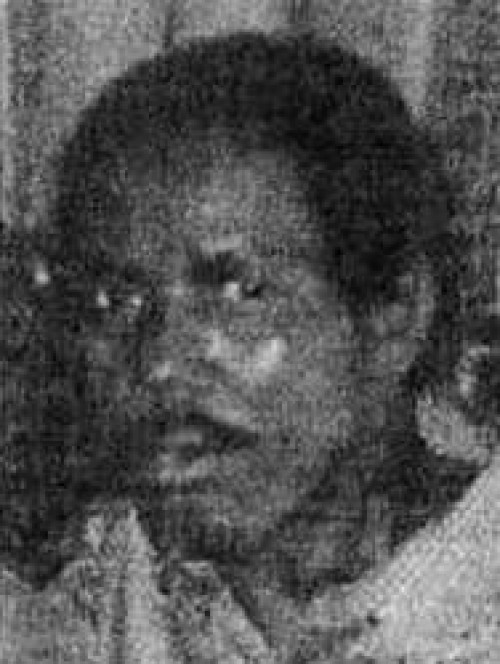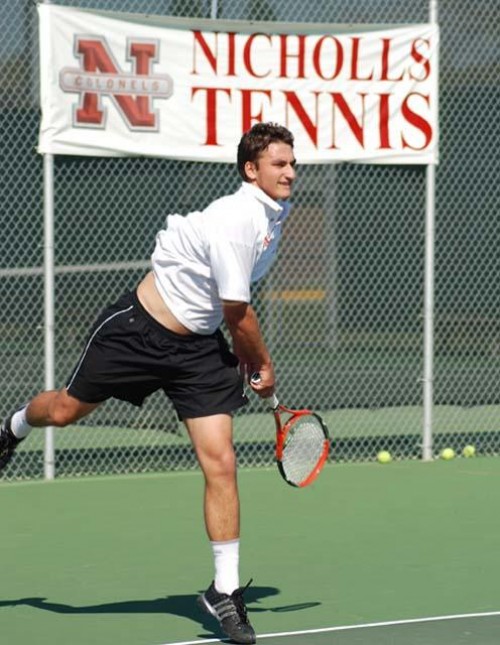
James "Bald Head" Dark
March 18, 2008March 20
March 20, 2008The Nicholls State tennis teams are like a good gumbo. Its success comes from ingredients originally from around the world but blended and seasoned in south Louisiana.
Whether from Europe, Africa, or other locales, the results this season have been tasty.
With the men’s team at 9-5 (2-1 in Southland Conference play) and the women’s team at 9-4 (2-3), second-year coach Jim Hunter is building the foundation for success one dialect at a time.
“I just wanted to find the best players who wanted to come to Nicholls,” Hunter said. “If they happened to come from outside the country, so be it.”
While foreign players make up a majority in the Southland Conference, Nicholls State is the only school where both men’s and women’s teams are without Americans.
The teams are comprised of four Romanians, two South Africans, two Indians, and one each from Mexico, France, Australia, Guatemala, Morocco, Bosnia, and Botswana.
“What made it so easy to adapt to Nicholls is the bond between all the players,” said Sami Mouline, 20, from Rabat, Morocco, about 55 miles northeast of Casblanca. “Everybody looks out for each other.”
The camaraderie among players is obvious – whether they are cheering on teammates during matches or sharing headphones to an iPod Nano before practice.
The players conceded their biggest adjustment in assimilating to the bayou region was the language barrier – not English, but the Cajun accent.
“After two months, I got used to the way people were talking,” said Mouline, a sophomore majoring in international business.
Coach Hunter, like his predecessor, Dominic T, Modise, finds players through an informal network of contacts, referrals, and friends of friends. “It’s very difficult to recruit,” Hunter said. “Schools like Nicholls, you know, don’t have a recruiting budget [for tennis] so you have to do it all by phone.”
In one day he can be talking with people from Canada, France, India and Belarus.
Due to Title IX compliance rules, the seven women’s team members are on full scholarships, while the eight men’s team players are on partial scholarships.
Hunter, a 28-year Army veteran before starting a second career as a tennis coach, anticipated the Colonels would be better this season. “We’re returning our top five players this year on the men’s side,” he said. “That’s why we’re feeling so confident.”
The Lady Colonels were not projected to do as well as they have so far this season. Hunter had to replace five players from last year’s team lost to graduations and transfers.
One of his recruits was freshman Natalia Zomora, 19, from Puelba, Mexico, about 75 miles southeast of Mexico City. Zomora started playing at age 10 at the Guido Lorandi Tennis Center and was a former national junior champion in Mexico before attending Nicholls.
“I always wanted to come to the states and play,” she said.
The decision to come up north was bittersweet for her family. “They [mother and younger sister] were happy for me but also sad to see me leave,” Zomora said.
Although most of the players have competed against national and international competition and have been living abroad for years, they insist playing college tennis has upgraded their game dramatically.
Mouline, aka Skunk (he won’t reveal the origin of the nickname), started playing at age 11. From ages 16-19, he trained at a tennis academy in France. His manager wanted to find the best university where he could improve his game. According to Mouline, playing in a college format has improved his competitive edge.
“We are not playing for ourselves, we’re playing for a team,” he said. “So then we have to fight on every point. We cannot give up, which was not the case back home. Sometimes I was giving up on matches because I didn’t want to play. Here, we can’t do that.”
Playing for Nicholls has additional family benefits. “They [Moulin’s parents and older sister] were very excited because by being here, that means they could come visit,” he said.
Sophomore Eric Fisher, 19, from Jeffreys Bay, South Africa, 425 miles east of Cape Town, was first recruited by fellow South African Modise. The biology major started playing at age seven and was trained by his father, Spencer. Eric has been living in boarding school since he was 15 so the move to Nicholls was not as difficult.
“You play so much more and the competition is so much higher, so you’re forced to improve and keep playing at a higher level all the time,” said Fisher. As to which parts of his game have risen most, he replied, “my midstroke, my backstroke and my transition game.”
Coach Hunter, 68, has made such a big impression on the Fisher household that Eric’s 17-year-old brother, David, plans on attending Nicholls in 2010.
Sophomore Phenyo Matong, 22, from Gaborone, Botswana, is another Modise recruit.
The government major got interested in tennis at age 11 when the International Tennis Federation began developing tennis centers in Africa during the 1990s.
Matong moved to South Africa at 14 to play in World Juniors Tennis; he was ranked 239th in the World International Tennis Federation Junior rankings by December 2003. He had to sit out the 2005-06 season because he was academically ineligible and played all the 06-07 season despite a left wrist injury.
Matong has a younger brother, Onkabetse, 19, who plays on the Southern University Tennis team, which Nicholls defeated 9-0 on the men’s side on Sunday. [Nicholl’s women also beat Southern 8-1 Sunday.]
“He’s younger and taller but… I can beat him,” Phenyo Matong uttered gleefully.
Matong did not play against his brother on Sunday, but they did last year. Phenyo Matong reluctantly revealed that Onkabetse won. However he did not say what the score was.
Most of the players wish to attempt a professional career once their college eligibility is over. “Everyone basically wants to play on tour,” said Matong.
However, Zomora, a dietetics major, has other ideas. “I want to work with athletes… as a nutritionist,” she said.
The bond forged among the tennis players is unmistakable, but each has also expanded their friendship circle beyond the courts.
Some have found love other than a tennis score. The one aspect of college life they have not yet indulged are Greek organizations.
“We’re in the tennis fraternity,” Matong joked.
They are more than that; they are a global family united by a passion for a sport. However they journeyed from their native part of the planet to the banks of Bayou Lafourche, it seemed to be worth the travel. As coach Hunter explained, “They’ve all got a story.”
Vlad-Lucian Popa, from Bralia, Romania, delivers a serve during practice at the Nicholls Tennis Courts. * Photo by KEYON JEFF












